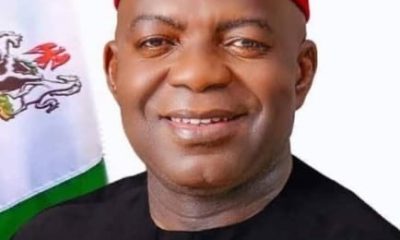NEWS
C’River Monarch’s Wife Raises the Alarm over Disappearance of Husband

From Ene Asuquo, Calabar
Wife of Clan head of Nkonib Quo clan, Ikot Ansa community, Calabar municipality local government area of Cross River State, Arit Maurice Omin – Iso, has cried out over the abduction of her husband.
Omin narrated that her husband was abducted from their residence on December 23, 2024 by armed men suspected to be security operatives at about 7pm to an unknown destination.
The monarch’s wife made the appeal while making comments on the disappearance of hubby during a chat with our correspondent in Calabar.
Although no security agent had admitted being in possession of the monarch whose whereabouts are yet to be known since December 23, 2024.
Findings by our correspondent however revealed that the Monarch’s travail began when he and other seven claimants dragged the state government in suit No: HC/314/2022 on behalf of (Ikot Ansa) Qua Clan to court challenging what they described as illegal acquisition of 369.579 hectares of their communal land by the state government for private purpose of Summit Hills.
Subsequently, six out of eight claimants decided to withdraw from the suit on grounds that they were not ready to fight against the State government because they were not consulted before the case was filed in court.
Determined to follow the matter to the latter, Ntufam Maurice Omin Iso and Ntufam Donatus Etim continued with the matter in Court and eventually settled the case with the government, executing terms of settlement.
Upon realizing that Etim and Iso were making some progress with the matter, Ntufam Paul Asim Ita with members of his faction returned to same court with another application for joinder as defendants against Ntufam Maurice Omin Iso and Ntufam Donatus Etim alleging that Maurice and Donatus did not seek community’s consent before going to court.
After hearing of the application, the court dismissed and refused the joinder on grounds that, the parties seeking to be joined having withdrawn from the suit cannot in turn bring an application for joinder as defendants against the claimants that is Maurice and Donatus in the same suit
On March 7, 2022, at High court 2, the presiding judge, Hon Justice B.T Ebuta, after describing the act of the six claimants as an attempt to frustrate Justice of the Case, ruled against the parties seeking to be joined as defendants.
The court thereafter ordered the release of 23 hectares of the land to Maurice and Donatus in compliance with the Judgment of the Court, The then Attorney General of Cross River State late Tanko AShang (SAN), of blessed memory, thereafter wrote in a letter in March 31, asking to Surveyor General of the State to carve out 23 hectares from the contentious plot of land and hand it over to Maurice and Donatus in line with the consent judgment of the High Court.
A letter dated March 11, 2022 from Summit Hills also directed the Surveyor General of the state to follow suit to the claimants.
Our correspondent gathered that in compliance and obedience with the consent judgment the Attorney General of the State on September 30, 2022 wrote to Ntufam Maurice and Ntufam Donatus formally handing over the 23 hectares of the said land to the claimants.
When Paul Asim Ita and his faction who had earlier withdrawn from the case and also failed in all their efforts to frustrate the judgment, they again filed a case in the High Court in HC/147/2022 asking the court to set aside the consent judgment entered in HC/314/2021.
Hon Justice Elias Abuo dismissed the Case seeking to set aside the consent judgment.
Similarly, the state Commissioner for Lands in a publication dated April 10, 2024 and 16, published in the Nigerian Chronicles page 15, handing over the same 23 hectares of that parcel of land in question to Paul Assim Ita, purportedly revoking the layout Plan earlier approved and issued to the claimants in line with the consent judgment, thereby handing over the land to Assim Ita’s faction irrespective of the consent Judgment.
However, while the suit challenging validity and legality of the actions of the Cross River State government and Paul Assim Ita was still pending and judgment reserved for February 4,2025,unfortunately, on December 23,2024 at about 7:pm, Ntufam Maurice Omin was abducted in his residence.
However, lead counsel to the monarch Chief Obono Obla, who earlier declined comment on the issue, insisted that the Attorney General AG knows the whereabouts of his client.
Obla claimed that on January 4, 2025 during a phone conversation, the Attorney General, Edemdem Charles Ani, had admitted that the abducted monarch, chief Maurice Iso, whose where about is yet to be known by family was arrested by security operatives and kept in custody of DSS because he was becoming a security risk.
He alleged that the Attorney General is angry with Maurice for installling his brother as Clan Head, grabbed lands belonging to the government, and carved out a community in Ikot Ansa for himself.
On the contrary the Attorney General (AG) and Commissioner for justice of the state, Ededem Ani, in a statement released on Thursday night last week alleged that the various media reports linking him and his office to the incident were all false and baseless denying any involvement in Chief Maurice Omin Iso’s travail stressing that the media reports were attempt calculated to tarnish his good image built over the years.
But Justice Ijeoma Ojukwu of the federal High Court Calabar, In suit No. FHC/CA/CS/3/2025, had earlier this month ordered the Department of State Security, DSS, and the Attorney General to produce Iso in court on January 15, 2025.
NEWS
Strike: JUSUN Members Lock out Judges, Lawyers, Litigants in Federal Courts in Ibadan

Judges, lawyers and litigants at the Federal High Court, Court of Appeal and National Industrial Court in Ibadan, on Monday, were locked out by protesting members of the Judiciary Staff Union of Nigeria (JUSUN).The national leadership of JUSUN had directed its members in the federal courts to embark on a strike on Monday over unpaid 25 per cent and 35 per cent salary increment, minimum wage and wage award.
A JUSUN official at the National Industrial Court, who craved anonymity, told Daily Asset in Ibadan that their salary was no longer enough as a result of current economic situation in the country. He said that the workers were seriously suffering while judges in the courts did not see them as part of them.According to the official, several steps taken to ensure their demands are met have been unsuccessful.The JUSUN representative said that no fewer than 10 members of staff of the National Industrial Court nationwide had died from February 2025 till date.“The suffering is too much and we are not asking for too much,” he said.Also speaking, a JUSUN official at the Court of Appeal, Ibadan, Mr Atanda Babatunde, said the strike was embarked on in compliance with the directive of the national leadership of JUSUN.Babatunde said that the strike would continue untill their demands were met.A lawyer, Mr Ismail Saka, who was at the Court of Appeal, Ibadan, expressed his disappointed over the strike.Saka said that he had been notified of his case coming up today and was surprised to have been locked out due to JUSUN strike.He said that one of his clients came from Sango-Ota, Ogun State, for the case, risking his life and wasting time and resources.He said that it was the right of JUSUN to embark on strike due to their entitlement while everyone was aware of the current economic reality in Nigeria.‘I urge the federal government to be compassionate and pay them their demands, which will make them live comfortable lives and not to be corrupted.Also, Mr Wale Oyegoke, who had a case at the Federal High Court in Ibadan, said he was angry that his case did not hold as a result of JUSUN strike.Oyegoke said that the Federal Government must treat the judiciary workers well, being a sensitive area.He said that the cost of living in Nigeria was already high while government was getting enough money due to subsidy removal.“The cost of transportation is very high, and if care is not taken, these staff will spend all their earnings on transportation.“I, as a person, spend N60,000 weekly on transportation.“Leaving home today, I thought my case would go on, but I am dsappointed that cases are not going on due to the strike.,” he said.A litigant, Mr Seye Olawale, who came from Lagos State, said that he was seriously pained risking his life on the bad road and wasting time and resources to come to Ibadan.(NAN)NEWS
C’ River Govt. Threatens to Sanction Firm for N1.2bn Unpaid Tax

The Cross River Government has threatened severe penalty on a firm, Bao Yao Iron and Steel Company, for owing the state N1.2 billion accrued tax liabilities.This was disclosed by Mr Ayi Bassey, Director Compliance, Cross River Internal Revenue Service (IRS) on Monday during a compliance drive by the service to the premises of the firm in Calabar.
Bassey said the service had taken steps provided by law but the company refused to discharge its statutory responsibility to the government. “We have served them demand notice, final demand notice; for four periods they have been issued pre action notices and they have done nothing to show they have a responsibility to the state.“As a service, we view this as a deliberate attempt on the part of the management of the company to undermine the developmental efforts of the present administration in the state.“We have placed the non compliance stickers as our final demand to them, beyond this, we will take necessary steps to ensure we enforce compliance,” he said.On his part, Mr Emmanuel Esira, Director Legal Services and Enforcement of Cross River IRS said the visitation was a further administrative step to get the company informed of their indebtedness to the government.According to him, “the tax we are asking for are deductions from staff salaries that have not been remitted to the tax authorities in the state since 2009.“The notification stickers will be on their premises until they comply and if they don’t respond, we will take further actions.Esira urged other companies doing business in the state not to allow situations to get to the point where they have to paste non compliance stickers in their premises before they carry out their obligations. (NAN)NEWS
Court Remands Man for Allegedly Stealing Electric Cable

A Badagry Chief Magistrates’ Court in Lagos State on Thursday, ordered the remand of a 35-year-old man, Segun Deala, for stealing Eko Electricity Distribution Company (EKEDC) cable.Deal whose address was not provided, had pleaded guilty to a two-count charge bordering on stealing and breach of peace.
The Chief Magistrate, Nurudeen Layeni ordered that he should be kept at the Awhajigho correctional facility in Badagry. He adjourned the case until Aug. 14, for fact and sentencingEarlier, the prosecution, ASP Edet Ekpo told the Court that the defendant committed the offences on May 9, at about 2p.m., at Gbenapon Ajara-Topa, Badagry, Lagos.Ekpo said that the defendant stole some length of electric cable with value yet unknown belonging to the EKEDC .He said the defendant conducted himself in a manner likely to cause breach of peace by destroying the cable.According to prosecutor, the offences contravened Sections 287 and 168 of the Criminal Law of Lagos 2015.














